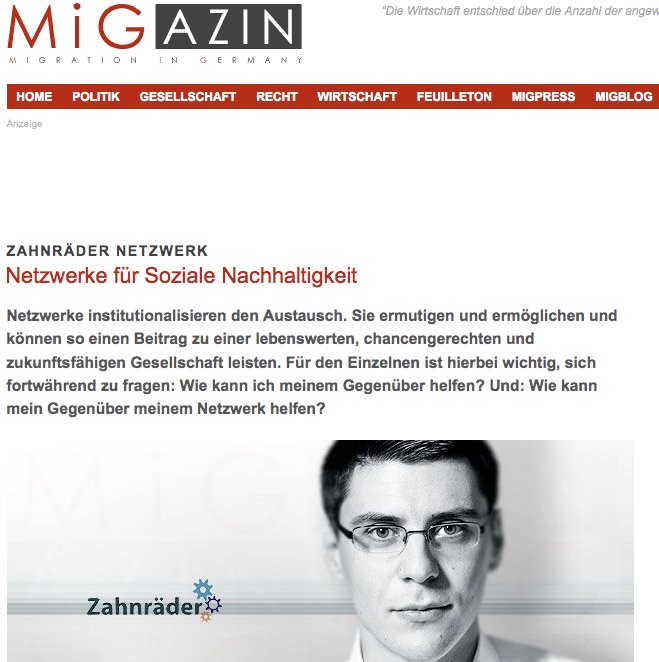Zahnräder ist eine Plattform für soziale Innovation. Wir helfen bei der Verwirklichung von den unterschiedlichsten Projekten – von der Idee über die Umsetzung bis zum gereiften Ergebnis. Wir fördern Soziales Unternehmertum, also Social Entrepreneurship, getreu dem Motto: von Muslimen für die Gesellschaft. Für mehr Teilnahme & Teilhabe an unserer Gesellschaft.
Zahnräder extern: Konferenz
Die nächste Konferenz findet im April in Heidelberg statt – man kann sich noch hier anmelden. Gewinner aus den letzten Jahren waren u.a. CubeMag, Hima, i,slam, Muhammadhoeren, Muslime.TV und StudyCoach 2.0. Wir bieten Ideen und Projekten Motivation, Wissen, Kontakte und finanzielle Unterstützung an (die vier Formen von Kapital in der Tabelle unten). Einige Projekte konnten durch das Preisgeld umgesetzt werden, andere Projekte brauchten noch einen Schuss Motivation oder Projektwissen, um den nächsten Schritt einzuleiten. Oft kamen auch Personen mit ähnlichen Ideen zusammen und haben sich daran gemacht, diese dann deutschlandweit umzusetzen. Aus zwei lokalen Ideen wurde so ein wirkliches und wirkendes bundesweites Projekt, das Deutschland mitbewegt. Dieses Jahr wird es übrigens Preisgelder von über 3000 Euro geben.
Und tolle ZahnräderX-Veranstaltungen bieten Zahnräder lokal an, z.B. in Berlin und NRW– vor der Haustür sozusagen.
| Ability | Usability | |
| Internal | Human Capital | Cultural & Motivational Capital |
| External | Social Capital | Financial Capital |
Zahnräder-Historie
Darum geht’s: Intern wie extern möchten wir einander „bewegen“ – innovativ, kreativ, professionell: ein Netzwerk muslimischer Entrepreneure. Zahnräder begann im März 2010 vor knapp 3 Jahren mit diesem Wunsch nach Bewegung. Nach einem ersten dreiköpfigen Treffen im März in Oxford waren wir im Mai bereits 7 – 7 Gründer. Und wie auch heute in vielen Teams haben wir uns lange Zeit nicht gesehen, sondern nur via Skype kommuniziert. 3 Jahre später sind wir knapp 100 Mitwirkende.
Unsere Partner
Wir haben vielfältige Partner: Jugend für Europa, British Council, das AKE Bildungswerk, die Sawasya Stiftung, der VdM und Ashoka Changemakers sind einige unserer Unterstützer. Letztes Jahr haben wir darüber hinaus den die Social Entrepreneurship Akademie Act for Impact Publikumspreis im Wert von 5000 Euro gewonnen. Zahnräder sagte: Danke.
Zahnräder intern: Institutionalisierter Weiterbildungsprozess
Zahnräder besteht aus einem Zwei-Säulen-Modell. Extern untersützen wir bei der Verwirklichung von Projekten. Intern bieten wir die Möglichkeit, einen Lern- und Mitwirkungsprozess zu durchlaufen und so nicht nur die Gesellschaft sondern auch sich nachhaltig zu prägen: vom Teammitglied, über die Teamleitung bis hin zum Kernteam.
Wir sind dabei matrixartig organisiert und jedes Zahnrad kann mehrere Bereiche durchlaufen. Unsere Projektgruppen sind die Konferenzorganisation, ZahnräderX und der Think Tank. Unsere funktionalen Gruppen sind IT, Presse, Personalwesen und Finanzen. Jedes Jahr planen wir diese Gruppen um einen Strang zu erweitern bzw. diese Gruppen auszubauen.
Quo vadis?
Wir werden den Entwicklungsprozess verstärkt institutionalisieren. Zahnräder durchlaufen unterschiedliche Stadien: vom Recruiting über Weiterbildung bis zum Exit und Alumni-Status. Wir suchen Menschen, die etwas bewegen möchten und wir bewegen sie. Das Recruiting bietet neuen Zahnrädern eine Aufnahme und Einstieg in die Organisation von Zahnräder. Weiterbildungsbausteine verknüpfen Theorie mit Praxis. Module können z.B. sein Digital Work, Corporate Identity, E-Teams, Leadership, Religion & Wirtschaft, Islamisches Entrepreneurship, Vision & Innovation.
Geplant ist eine Internationalsierung der Tätigkeiten. Dieses Jahr konzentrieren wir uns auf den deutschsprachigen Raum. So findet unsere Konferenz dieses Mal auch weiter südlich statt, um so die Anfahrt aus der Schweiz und aus Österreich zu erleichtern. In einigen Jahren könnten dann Kooperationen und Partnerschaften entstehen, die verstärkt europäisch und global sind. Mit unserem Unterstützer Jugend für Europa sind wir hierbei einen wichtigen ersten Schritt gegangen.
Wir möchten ein professioneller Ansprechpartner für die Umsetzung von Projekten jeglicher Stufe sein: Von vor der Idee bis hin zur Reflektion. Zahnräder hat noch einen langen Weg vor sich. Wir suchen hierfür nach Weggefährten. Wer Interesse hat, kann sich bei uns melden. Unsere Broschüre bietet eine kompakte Übersicht.
Ansprechpartner:
- Wer an der Konferenz teilnehmen möchte: konferenz2013@zahnraeder-netzwerk.de
- Wer bei Zahnräder mitwirken möchte: hr@zahnraeder-netzwerk.de
- Wer uns unterstützen möchte: finanzen@zahnraeder-netzwerk.de
Wir werden weiter versuchen intern wie extern nachhaltigen Wandel zu kreieren und so leidenschaftlich unseren Beitrag zu einem positiven Wandel in unserer Gesellschaft zu leisten.









